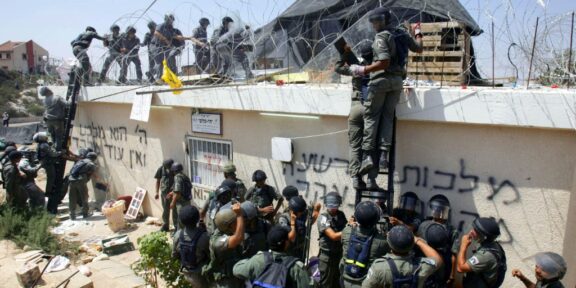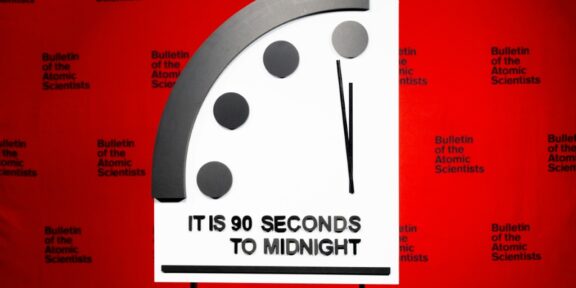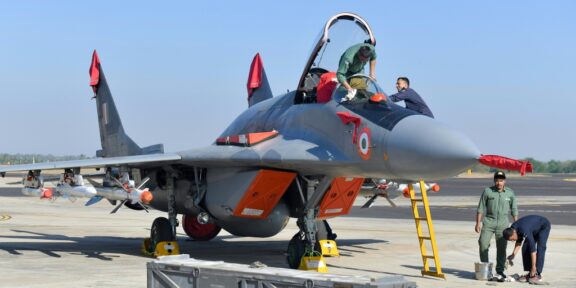Fears of a regional war rose Thursday after Lebanon’s powerful Hezbollah movement said none of Israel would be spared in a full-blown conflict, and Israel said it had approved plans for a Lebanon offensive.
Hezbollah said it fired dozens of rockets into northern Israel in retaliation for a deadly air strike in south Lebanon that Israel said killed a Hezbollah operative.
Hezbollah also claimed several other attacks on Israeli troops and positions on Thursday.
Experts are divided on the prospect of wider war, almost nine months into Israel’s vow to eradicate Hamas, the Palestinian militant group in the Gaza Strip.
Hezbollah chief Hassan Nasrallah’s group and Israeli forces have exchanged near-daily fire since Hamas’s October 7 attack on southern Israel triggered the Gaza war, and the bellicose talk has escalated along with the strikes.
In a televised address, Nasrallah said “no place” in Israel would “be spared our rockets” if a wider war began.
The chief of the Iran-backed group also threatened nearby Cyprus if it opened its airports or bases to Israel “to target Lebanon”.
European Union member Cyprus houses two British bases, including an airbase, but they are in sovereign British territory and not controlled by the Cypriot government.
On Thursday Cyprus government spokesman Konstantinos Letymbiotis dismissed as “totally groundless” any suggestion of possible involvement in a conflict related to Lebanon.
Warplanes from the British airbase in Cyprus have, along with US forces, attacked Yemen’s Iran-backed Huthi rebels who have for months been targeting Red Sea shipping.
On Wednesday the US military said its forces destroyed two Huthi sites in Yemen.
– ‘Urgent’ de-escalation –
The October Hamas attack on Israel resulted in the deaths of 1,194 people, mostly civilians, according to an AFP tally based on Israeli official figures.
The militants also seized hostages, 116 of whom remain in Gaza although the army says 41 are dead.
Israel’s retaliatory offensive in Gaza has killed at least 37,431 people, also mostly civilians, according to the health ministry in the Hamas-ruled territory.
The latest toll on Thursday included at least 35 deaths over the previous day, the ministry said.
The Huthis and Hezbollah both say they are acting in response to Israel’s actions in Gaza.
On Tuesday, Israel’s military announced that “operational plans for an offensive in Lebanon were approved and validated”.
The same day, Hezbollah published a video showing drone footage it purportedly recorded over northern Israel, including parts of Haifa’s city and port.
US envoy Amos Hochstein has called for “urgent” de-escalation, while the UN special coordinator for Lebanon Jeanine Hennis-Plasschaert said there was “no inevitability to conflict” as she visited UN peacekeepers in south Lebanon.
The cross-border violence has killed at least 479 people in Lebanon, most of them fighters but also 93 civilians, according to an AFP tally.
Israeli authorities say at least 15 soldiers and 11 civilians have been killed in the country’s north.
Weary residents of Beirut on Thursday downplayed the chances of war in Lebanon, which a political deadlock has left essentially leaderless while a five-year economic meltdown continues.
In Israel, some citizens called for action against Hezbollah, and Noam Galili, 29, said: “I know what it is like to live close to Lebanon, but it never felt as dangerous as it does now.”
– Pressures –
The violence has already displaced tens of thousands of people, mostly in Lebanon but also in northern Israel.
In southern Gaza, a United Nations mission found hundreds of thousands of displaced people “suffer from poor access to shelter, health, food, water and sanitation,” a UN report said late Wednesday.
In central Gaza, residents said they had turned to cooking oil to power their cars.
US President Joe Biden has called for the implementation of a ceasefire plan he outlined last month.
Hochstein and Washington’s top diplomat, Blinken, say a deal to curb fighting in Gaza would by extension help resolve the Hezbollah-Israel violence.
Israeli Prime Minister Benjamin Netanyahu’s far-right coalition partners strongly oppose a Gaza ceasefire.
He is also facing regular street protests by tens of thousands demanding a deal to free the hostages, and accusing him of prolonging the war.
“We will not leave the Gaza Strip until all of the hostages return,” Netanyahu on Thursday told relatives of hostages killed in the territory.
“We do not have the option of giving up.”
In a separate statement on Thursday he called the war a battle for Israel’s existence.
“I am prepared to suffer personal attacks provided that Israel receives the ammunition from the US that it needs in the war for its existence,” he said.
His statement came after he angered Washington with a video statement accusing it of “withholding weapons and ammunitions to Israel”.
The White House on Thursday called Netanyahu’s video statement “vexing”.
Israeli military spokesman Rear Admiral Daniel Hagari told Israel’s Channel 13 on Wednesday: “To say that we are going to make Hamas disappear is to throw sand in people’s eyes. If we don’t provide an alternative, in the end, we will have Hamas.”
US Secretary of State Antony Blinken last month said Washington had not seen an Israeli post-war plan and “the trajectory Israel is on” would still leave thousands of Hamas fighters.
Israeli government spokesman David Mencer said Thursday that Hamas’s “final stronghold” in Rafah on the border with Egypt is systematically being taken apart.
“And we will win,” he told a press briefing.
Yeswecantv





